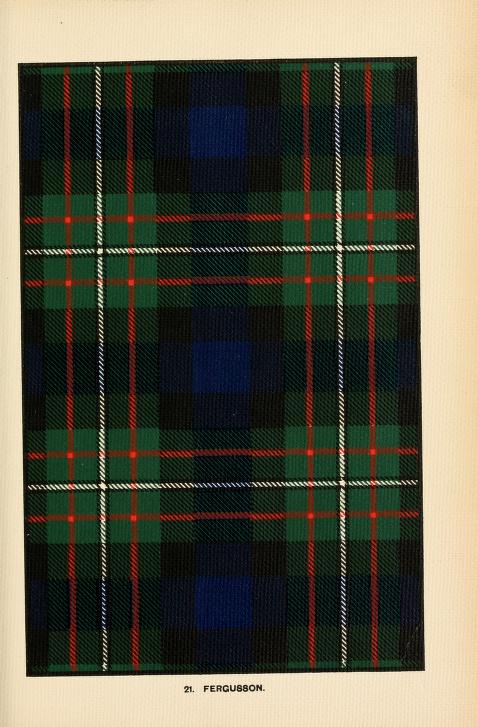from “The Scottish clans and their tartans”, W & AK Johnston, circa 1900 archive.org
The name and clan of Fergusson have, singular to say, been more distinguished in times of peace than those of war and tumult, though many of the clan abode in Glenshee.
Among the earlier occurrences of the name, under David II., is a charter by Thomas, Earl of Mar, to Eugene Fergusson of the lands of Uchtevterene, in Cromar ; and in 1008, when John Fergusson of Stravith, with Sir William Scott of Balwearie and others, witnessed a bond of Manrent. At the Reformation, when a distribution of Preachers was made in 1560, David Fergusson was appointed to Dumfermline ; and in 1582, with Erskine of Dun and others, he formed one of a deputation to James VI. concerning the grievances of the Church. Four years previously there had been a complaint against him and others in a case of disputed jurisdiction between the Kirk and the civil power.
In 1587 Fergusson of Craigdarroch (or Craigdarnoch), apparently the oldest line of the family, with Sir John Gordon of Lochinvar and others, was summoned before the Council for having been in rebellion against the King, and fined 3000 merks.
In 1649 “ John Fergusson of Cragdare “ (darroch) was Commissioner in Parliament for Dumfries- shire (Act Pnrl. Scot.). Two of the clan, one known as “ Robert the Plotter,“ and his brother, a General, came promi- nently forward in the early part of the 17th century. They were sons of the Laird of Badyfarow, near Inverury. Robert went to London as an Independent minister, and took an active part in many conspiracies, among others, the famous Ryehouse Plot ; but he escaped detection once by hiding in the Tol’oooth of Edinburgh, and he joined in every scheme against Charles II. and James VII. At the Revolution he was rewarded for his rogueries by an appointment in the Excise; and being dissatisfied, he took to plotting against William III., and wrote against his Government with great effect, but always contrived to elude punishment. Among his publications were a Vindication of the Colony at Dat-ien, a History of the Revolution, etc. He died in 1714. His brother James Fergusson, a Major-General of 1705, served with distinction under Marl- borough, and is mentioned with honour in the Blenheim Despatches. He led the attack on the village. His descendants still possess lands at Kimmundy, in Aberdeenshire. Another of the name, William Fergusson, was an eminent painter in still life. He travelled in Italy and France, and died in 1690.
Sir John Fergusson of Kilkerran held extensive estates in Ayrshire in the time of Charles I. His son John was made a Baronet in 1703, according to Burke, and his grandson was Lord Kilkerran. Sir Adam, third Baronet, claimed the Earldom of Glencairn, but failed to make good his title. The Fergussons, Baronets of Farm, Tyrone, went there from Scotland 280 years ago. James Fergusson, the eminent self-taught philosopher, born in 1710; Adam Fergusson, LL.D , the great historian and moral philosopher, born in 1724 ; Robert Fergusson, the unfortunate poet, born in 1750 ; James Fergusson, the architect, born in 1808 ; and Sir William Fergusson, Bart., F.R.S., born in the same year, have all cast a lustre on this clan and surname. “Annie Laurie,” of Maxwellton, so famed in Scottish song, became the wife of Fergusson of Craigdarroch ; and their descendant, Robert Cutlar Fergusson, the accomplished scholar, figures in Burns’ well-known poem, “The Whistle.” Brigadier General Fergusson bore a distinguished part at the capture of the Cape of Good Hope ; he commanded the Highland Brigade, consisting of the 71st, 72nd, and 93rd Regiments, and led the charge which put the enemy to flight.
Sir Adam Fergusson, third Baronet, died in 1813, and was succeeded by his nephew, James, fourth Baronet, who died in 1838. He was succeeded by his son Charles, fifth Baronet, who died in 1849, leaving the Right Honourable Sir James Fergusson, sixth Baronet, G.C.S.I., K.C.M.G. etc
